一般将来时的用法6
一般将来时态
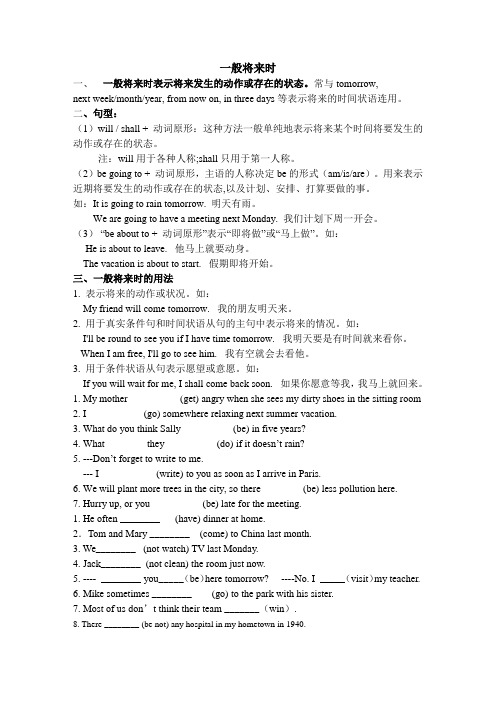
一般将来时一、一般将来时表示将来发生的动作或存在的状态。
常与tomorrow,next week/month/year, from now on, in three days等表示将来的时间状语连用。
二、句型:(1)will / shall + 动词原形:这种方法一般单纯地表示将来某个时间将要发生的动作或存在的状态。
注:will用于各种人称;shall只用于第一人称。
(2)be going to + 动词原形,主语的人称决定be的形式(am/is/are)。
用来表示近期将要发生的动作或存在的状态,以及计划、安排、打算要做的事。
如:It is going to rain tomorrow. 明天有雨。
We are going to have a meeting next Monday. 我们计划下周一开会。
(3)“be about to + 动词原形”表示“即将做”或“马上做”。
如:He is about to leave. 他马上就要动身。
The vacation is about to start. 假期即将开始。
三、一般将来时的用法1. 表示将来的动作或状况。
如:My friend will come tomorrow. 我的朋友明天来。
2. 用于真实条件句和时间状语从句的主句中表示将来的情况。
如:I'll be round to see you if I have time tomorrow. 我明天要是有时间就来看你。
When I am free, I'll go to see him. 我有空就会去看他。
3. 用于条件状语从句表示愿望或意愿。
如:If you will wait for me, I shall come back soon. 如果你愿意等我,我马上就回来。
1. My mother __________(get) angry when she sees my dirty shoes in the sitting room2. I ___________(go) somewhere relaxing next summer vacation.3. What do you think Sally __________(be) in five years?4. What ________they __________(do) if it doesn’t rain?5. ---Don’t forget to write to me.--- I ___________(write) to you as soon as I arrive in Paris.6. We will plant more trees in the city, so there ________(be) less pollution here.7. Hurry up, or you __________(be) late for the meeting.1. He often ________ (have) dinner at home.2.Tom and Mary ________ (come) to China last month.3. We________ (not watch) TV last Monday.4. Jack________ (not clean) the room just now.5. ---- ________ you_____(be)here tomorrow? ----No. I _____(visit)my teacher.6. Mike sometimes ________ (go) to the park with his sister.7. Most of us don’t think their team _______(win).8. There ________ (be not) any hospital in my hometown in 1940.。
一般将来时态的结构和用法
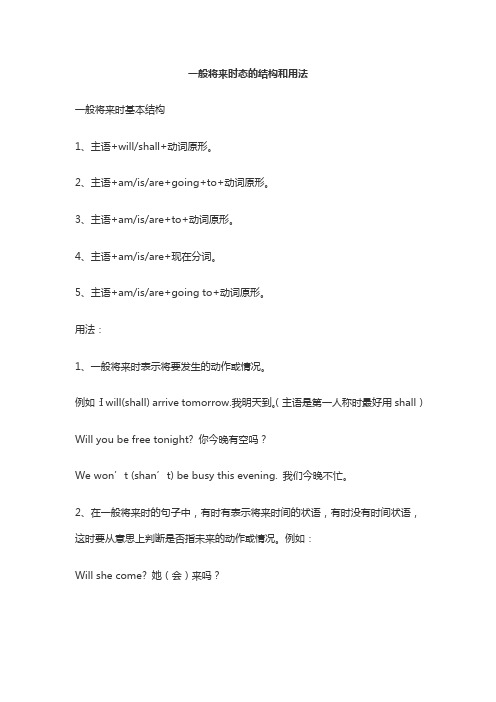
一般将来时态的结构和用法一般将来时基本结构1、主语+will/shall+动词原形。
2、主语+am/is/are+going+to+动词原形。
3、主语+am/is/are+to+动词原形。
4、主语+am/is/are+现在分词。
5、主语+am/is/are+going to+动词原形。
用法:1、一般将来时表示将要发生的动作或情况。
例如:I will(shall) arrive tomorrow.我明天到。
(主语是第一人称时最好用shall)Will you be free tonight? 你今晚有空吗?We won’t (shan’t) be busy this evening. 我们今晚不忙。
2、在一般将来时的句子中,有时有表示将来时间的状语,有时没有时间状语,这时要从意思上判断是否指未来的动作或情况。
例如:Will she come? 她(会)来吗?3、在以第一人称I或we作主语的问句中,一般使用助动词shall,这时或是征求对方的意见,或是询问一个情况(b):a. Where shall we meet? 我们在哪儿碰头?b. Shall we have any classes tomorrow?明天我们有课吗?在这类问句中,近几年来也有不少人用will,特别是在美国。
例如:How will I get there? 我怎么去?扩展资料:一般将来时表示将来某一时段的动作或状态,或将来某一段时间内经常的动作或状态。
在英语时态中,“时“指动作发生的时间,”态“指动作的样子和状态。
一般将来时常常和表示将来的时间状语连用。
如:tomorrow(明天),next week (下周);in the future(将来);in a year(一年以后)等。
一般将来时由助动词shall(第一人称),will(所有人称)动词原形构成。
美式英语则不管什么人称,一律用will。
或用主语+be动词+ going to 动词(be going to)。
一般将来时的使用方法是什么
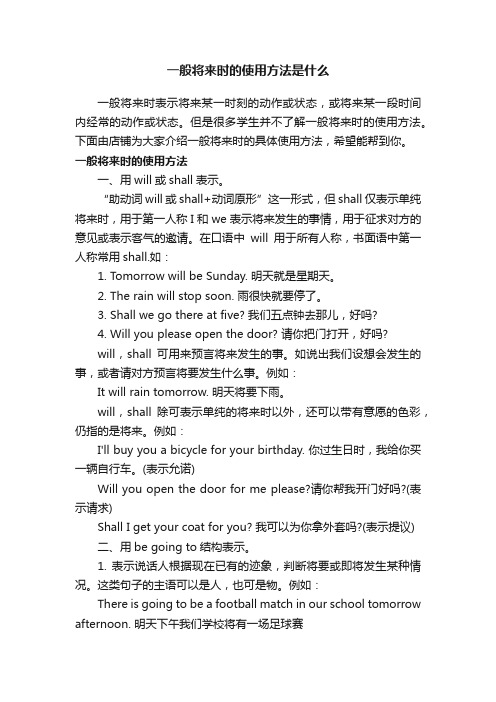
一般将来时的使用方法是什么一般将来时表示将来某一时刻的动作或状态,或将来某一段时间内经常的动作或状态。
但是很多学生并不了解一般将来时的使用方法。
下面由店铺为大家介绍一般将来时的具体使用方法,希望能帮到你。
一般将来时的使用方法一、用will或shall表示。
“助动词will或shall+动词原形”这一形式,但shall 仅表示单纯将来时,用于第一人称I和we表示将来发生的事情,用于征求对方的意见或表示客气的邀请。
在口语中will用于所有人称,书面语中第一人称常用shall.如:1. Tomorrow will be Sunday. 明天就是星期天。
2. The rain will stop soon. 雨很快就要停了。
3. Shall we go there at five? 我们五点钟去那儿,好吗?4. Will you please open the door? 请你把门打开,好吗?will,shall可用来预言将来发生的事。
如说出我们设想会发生的事,或者请对方预言将要发生什么事。
例如:It will rain tomorrow. 明天将要下雨。
will,shall除可表示单纯的将来时以外,还可以带有意愿的色彩,仍指的是将来。
例如:I'll buy you a bicycle for your birthday. 你过生日时,我给你买一辆自行车。
(表示允诺)Will you open the door for me please?请你帮我开门好吗?(表示请求)Shall I get your coat for you? 我可以为你拿外套吗?(表示提议)二、用be going to结构表示。
1. 表示说话人根据现在已有的迹象,判断将要或即将发生某种情况。
这类句子的主语可以是人,也可是物。
例如:There is going to be a football match in our school tomorrow afternoon. 明天下午我们学校将有一场足球赛(已有告示)I feel terrible.I think I'm going to die. 我感到难受极了,我想我快不行了。
“一般将来时”的几种语法形式[整理版]
![“一般将来时”的几种语法形式[整理版]](https://img.taocdn.com/s3/m/6c03bef44bfe04a1b0717fd5360cba1aa8118c39.png)
“一般将来时”的几种语法形式一般将来时的语法形式主要有四种:shall / will +动词原形;be going to +动词原形;现在进行时和一般现在时。
现将这四种形式分述如下:一、shall / will +动词原形1. will可用于所有人称,但shall 仅表示单纯将来时,用于第一人称I和we,作为will的一种替代形式。
以Y ou and I为主语时通常避免用shall。
例如:He will be back soon. 他很快就会回来。
I shall/will be free on Sunday. 星期天我有空。
Y ou and I will work in the same factory. 你和我将在同一工厂工作。
2. will, shall可用来预言将来发生的事。
如说出我们设想会发生的事,或者请对方预言将要发生什么事。
例如:It will rain tomorrow. 明天将要下雨。
3. will, shall除可表示单纯的将来时以外,还可以带有意愿的色彩,仍指的是将来。
例如:I’ll buy you a bicycle for your birthday. 你过生日时,我给你买一辆自行车。
(表示允诺) Will you open the door for me please? 请你帮我开门好吗?(表示请求)Shall I get your coat for you? 我可以为你拿外套吗?(表示提议)二、be going to +动词原形1. 表示说话人根据现在已有的迹象,判断将要或即将发生某种情况。
这类句子的主语可以是人,也可是物。
例如:There is going to be a football match in our school tomorrow afternoon. 明天下午我们学校将有一场足球赛。
(已有告示)I feel terrible. I think I’m going to die. 我感到难受极了,我想我快不行了。
一般将来时的五种表达方法
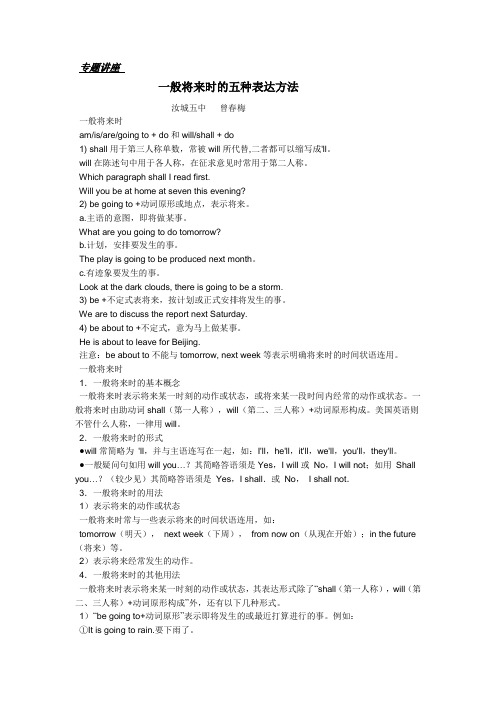
专题讲座一般将来时的五种表达方法汝城五中曾春梅一般将来时am/is/are/going to + do和will/shall + do1) shall用于第三人称单数,常被will所代替,二者都可以缩写成'll。
will在陈述句中用于各人称,在征求意见时常用于第二人称。
Which paragraph shall I read first.Will you be at home at seven this evening?2) be going to +动词原形或地点,表示将来。
a.主语的意图,即将做某事。
What are you going to do tomorrow?b.计划,安排要发生的事。
The play is going to be produced next month。
c.有迹象要发生的事。
Look at the dark clouds, there is going to be a storm.3) be +不定式表将来,按计划或正式安排将发生的事。
We are to discuss the report next Saturday.4) be about to +不定式,意为马上做某事。
He is about to leave for Beijing.注意:be about to不能与tomorrow, next week等表示明确将来时的时间状语连用。
一般将来时1.一般将来时的基本概念一般将来时表示将来某一时刻的动作或状态,或将来某一段时间内经常的动作或状态。
一般将来时由助动词shall(第一人称),will(第二、三人称)+动词原形构成。
美国英语则不管什么人称,一律用will。
2.一般将来时的形式●will常简略为'll,并与主语连写在一起,如:I'll,he'll,it'll,we'll,you'll,they'll。
一般将来时的五种表达方法

一般将来时的五种表达方法Company number:【WTUT-WT88Y-W8BBGB-BWYTT-19998】专题讲座一般将来时的五种表达方法汝城五中曾春梅一般将来时am/is/are/going to + do和will/shall + do1) shall用于第三人称单数,常被will所代替,二者都可以缩写成'll。
will在陈述句中用于各人称,在征求意见时常用于第二人称。
Which paragraph shall I read first.Will you be at home at seven this evening2) be going to +动词原形或地点,表示将来。
a.主语的意图,即将做某事。
What are you going to do tomorrowb.计划,安排要发生的事。
The play is going to be produced next month。
c.有迹象要发生的事。
Look at the dark clouds, there is going to be a storm.3) be +不定式表将来,按计划或正式安排将发生的事。
We are to discuss the report next Saturday.4) be about to +不定式,意为马上做某事。
He is about to leave for Beijing.注意:be about to不能与tomorrow, next week等表示明确将来时的时间状语连用。
一般将来时1.一般将来时的基本概念一般将来时表示将来某一时刻的动作或状态,或将来某一段时间内经常的动作或状态。
一般将来时由助动词shall(第一人称),will(第二、三人称)+动词原形构成。
美国英语则不管什么人称,一律用will。
2.一般将来时的形式●will常简略为'll,并与主语连写在一起,如:I'll,he'll,it'll,we'll,you'll,they'll。
一般将来时构成及用法

2. be going to+动词原形可表示事先计划的意图,而 will 则表示说话人当时决定的意图; We're going to drive you home after the meeting. Don't call a taxi. We'll drive you home. I feel ill now, and I'll go to see the doctor. I'm going to see the doctor this evening.
2. shall/will + 动词原形
一般将来时助动词shall/will + 动词原形 (当主语第一人称时,一般用shall,shall用于第一 人称,常被will 所代替。) 肯定式: 主语+shall/will+动词原形+其他 否定式: 主语+shall/will+not+动词原形+其他. 疑问式: Shall/Will+主语+动词原形+其他 简略回答: (肯) Yes,主语+shall/will . (否) No,主语+shall/will+not …
一、一般将来时的构成及用法:
一般将来时表示将来发生的动作或存在的状态也表 示将来经常或重复发生的动作。 常与表示将来的时间状语连用。如:tomorrow , soon , next Monday , next year , next weekend , this afternoon , this evening ……
1.be going to + 动词原形
主语 I 肯定句 否定句 一般疑问句 …am going to …am not going Are…going to work to work work? Is…going to work? Are…going to work?
一般将来时的用法
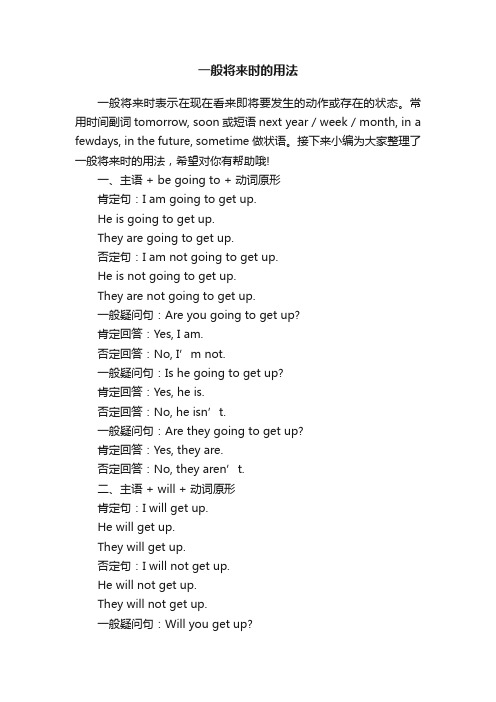
一般将来时的用法一般将来时表示在现在看来即将要发生的动作或存在的状态。
常用时间副词tomorrow, soon或短语next year / week / month, in a fewdays, in the future, sometime 做状语。
接下来小编为大家整理了一般将来时的用法,希望对你有帮助哦!一、主语 + be going to + 动词原形肯定句:I am going to get up.He is going to get up.They are going to get up.否定句:I am not going to get up.He is not going to get up.They are not going to get up.一般疑问句:Are you going to get up?肯定回答:Yes, I am.否定回答:No, I’m not.一般疑问句:Is he going to get up?肯定回答:Yes, he is.否定回答:No, he isn’t.一般疑问句:Are they going to get up?肯定回答:Yes, they are.否定回答:No, they aren’t.二、主语 + will + 动词原形肯定句:I will get up.He will get up.They will get up.否定句:I will not get up.He will not get up.They will not get up.一般疑问句:Will you get up?肯定回答:Yes, I will.否定回答:No, I won’t.一般疑问句:Will he get up.肯定回答:Yes, he will.否定回答:No, he won’t.一般疑问句:Are they going to get up?肯定回答:Yes, they are.否定回答:No, they aren’t.一般将来时/式(The Simple Future tense)时态定义be going to表主观的打算shall和will常常缩写成'll ,紧接在主语之后。
- 1、下载文档前请自行甄别文档内容的完整性,平台不提供额外的编辑、内容补充、找答案等附加服务。
- 2、"仅部分预览"的文档,不可在线预览部分如存在完整性等问题,可反馈申请退款(可完整预览的文档不适用该条件!)。
- 3、如文档侵犯您的权益,请联系客服反馈,我们会尽快为您处理(人工客服工作时间:9:00-18:30)。
一般将来时用法比较一般将来时表示将来某个时间要发生的动作或存在的状态,也表示将来经常或反复发生的动作,常与表示将来的时间状语连用。
例如:tomorrow , tomorrow morning / afternoon …,the day after tomorrow , next year , next month …, from now on (从现在开始),in an hour (一小时后),in two days / weeks …等。
一般将来时的表示方法有多种形式。
例如:will / shall +动词原形;be going to+动词原形;be+v. ing;be to (be about to)+动词原形结构等。
现将其用法做一归纳并予以说明和比较。
1. be going to+动词原形结构的用法(1)这种结构表示主体现在的意图,即打算在最近或将来要做某事,主语通常指人。
在被动结构中,主语也可指物,但动作的执行者仍然是人。
例如:A. What are you going to do next Sunday ? 下星期天你打算干什么?B. She’s going to be a teacher. 她打算当一名教师。
C. The wall is going to be brushed white . 这面墙将刷成白色。
(2)表示说话人根据已有的迹象认为很可能即将发生某事。
这时主语既可指人也可指物,此结构往往表示客观事态的发展,而不是表示主观的意图。
例如:A. Look at these black clouds. —It’s going to rain . 看这些乌云。
天快要下雨了。
B. I’m afraid I’m going to have a bad cold恐怕我要得重感冒。
2. will / shall+动词原形结构的用法这种结构是表示将来的动作或状态。
常伴有表示将来的时间状语。
shall用于第一人称,will用于第二、三人称,但在现代英语中will可以通用于各种人称。
在问句中shall常用于第一人称表示建议或征求对方意见。
例如:A. I shall write you a letter next month. 我下个月给你写信。
B. I will go to my home town next week . 我下周去老家。
C. Shall we go to the park?我们去公园好吗?注:be going to与will用法上的异同及比较说明:(1)be going to与will都可用来表示即将发生的事情。
前者多用于口语,后者常用于书面语和正式文告中。
例如:A. There’ll (=is going to) be a football match in our school next week . 下周我校将举行(有)一场足球赛。
B. The American basketball team will arrive in Beijing tomorrow.美国篮球队明天将抵达北京。
(2)be going to 与will都可用来表示意图。
例如:I will (=am going to)climb the hill tomorrow. 我将于明天去登山。
注:一般来说,“意图”是事先经过考虑的,用be going to表示;反之则用will。
will还多用于对话中,即一方听了对方的话后所作出的反应。
例如:A. They’re going to meet at the school gate . 他们打算在学校大门见面。
B. ——Please bring me a cup of tea . 请给我端杯茶来。
——I’ll do it in a minute我马上就去(端)。
(3)be going to常含有“即将”之意;而will即可表示“即将”又可表示“较长时间后的未来”,或不表示任何特定的将来时间概念。
例如:A. We’re going to visit the factory . 我们即将去参观那家工厂。
B. He’ll write a book one day . 他有朝一日要写书。
C. The house will break down.那屋子(迟早)要倒塌。
(4)表示预测:“be going to”表示有发生某事的迹象;will则表示说话者认为或相信要发生某事。
例如:A. It’s very dark and cold. It’s going to snow.天很暗而且非常冷,要下雪了。
B. I’m sure he’ll be back in an hour . 我确信他一小时后会回来。
(5)在表示“询问对方是否愿意”以及表示“客气的邀请”时,常用will。
例如:A. Will you lend me the book? 你能把那本书借给我吗?B. Will you go there with us?你能和我们一起去那儿吗?(6)be going to可用于条件句,表示将来的时间,will一般不能。
例如:If you are going to watch TV this evening , you’d better finish your homework now .你若想今晚看电视,最好现在就完成作业。
注:如果不是表示将来的时间,而是表示“意愿、坚持、推论”等,will也可用于条件句。
例如:A. If you will learn English , I’ll help you .你若愿意学习英语,我将帮助你。
B. If you will kindly wait a moment, I’ll ask him to go there with you.你若耐心等一会的话,我将叫他和你一起去那儿。
(7)如果条件从句表示将来发生的动作或状态,主句中常用will,而条件从句中则用一般现在时表示。
例如:If you go to England , you will like the food there.如果你去英国的话,你将会喜欢那儿的食物。
注:若条件从句表示的是现在的动作或状态,主句中也可用be going to。
例如:If I have enough money , I’m going to take a trip abroad .若我有足够钱的话,我就出国旅游一趟。
3. be+动词不定式结构的用法这种结构着重指按计划或安排将要发生某事。
常表示“职责、意图、约定、可能性”等。
例如:A. You are to be back by 11 o’clock. 你必须11点回来。
B. We are to meet at the zoo. 我们约定在动物园见面。
C. The football match is not to be played today. 今天不能举行足球比赛了。
4. be about+动词不定式结构的用法这种结构表示“最近或马上要发生的动作”,一般用于书面体,较为正式,一般不用时间状语。
例如:A. The meeting is about to begin.会议马上开始。
B. Summer harvest is about to start. 夏收即将开始。
be about to…when…是固定搭配,表示“刚一…,就”。
She was about to go out when it rained.I was about to go to bed when there was a knock at the door.5. be+v. ing结构的用法这种结构表示按计划即将发生的动作,用进行时形式表示将来的时间,但只适用于表示位置移动的动词。
例如:go , come , leave , start , arrive , move , return , fly (乘飞机)等,并常伴有表示将来时间的状语以区别于进行时的动作。
例如:A. Where are you going this Saturday ?这个星期六你准备去哪儿?B. The Greens are moving to another city the day after tomorrow. 格林一家后天要搬迁到另一个城市。
C. Mr. Li is flying to Shanghai tomorrow morning. 李先生明天早晨乘飞机去上海。
6. 用一般现在时表示将来的时间的用法这种用法除了动词be外,一般适用于表示位置转移的动词(见5),或表示根据规定或时间表上预计要发生的动作或事态。
此外,在由“if , when , as soon as , until , till , after , before”等引导的条件或时间状语从句中,若主句为将来时,从句通常用一般现在时表示将来的时间。
例如:A. I’m free this afternoon. 我今天下午有空。
B. School starts on September 1.学校9月1日开学。
C. What time does the train go?火车什么时间开?D. If you use your head you’ll have a good idea. 如果你动动脑筋,就会想出好办法。
E. I’ll give the book to him as soon as he returns. 他一返回来,我就把书给他。
在让步状语从句中,也可以用一般时表示将来发生的行为。
Whether she comes or not, I will go there.No matter what he says, I won’t listen to him.一般将来时的特殊结构用法表示将要发生的动作或情况,除了一般将来时之外,还有一些其它结构和时态。
一、be going to +v v既可以是动作动词,也可以是状态动词。
用法:1. 指事先经过考虑的现在意图,即打算或准备在最近或将来进行某事。
We’re going to France next summer.The teachers are going to join us in the English evening.How are you going to spend your holidays?I’m going to practise the piano for two hours this evening.在这类句子中,主语通常指人。
在被动形式中,主语可能指物,但动作执行者仍然是人。
The wall is going to be painted green.2. 表示现在已有迹象表明将要发生或即将发生某种情况。
